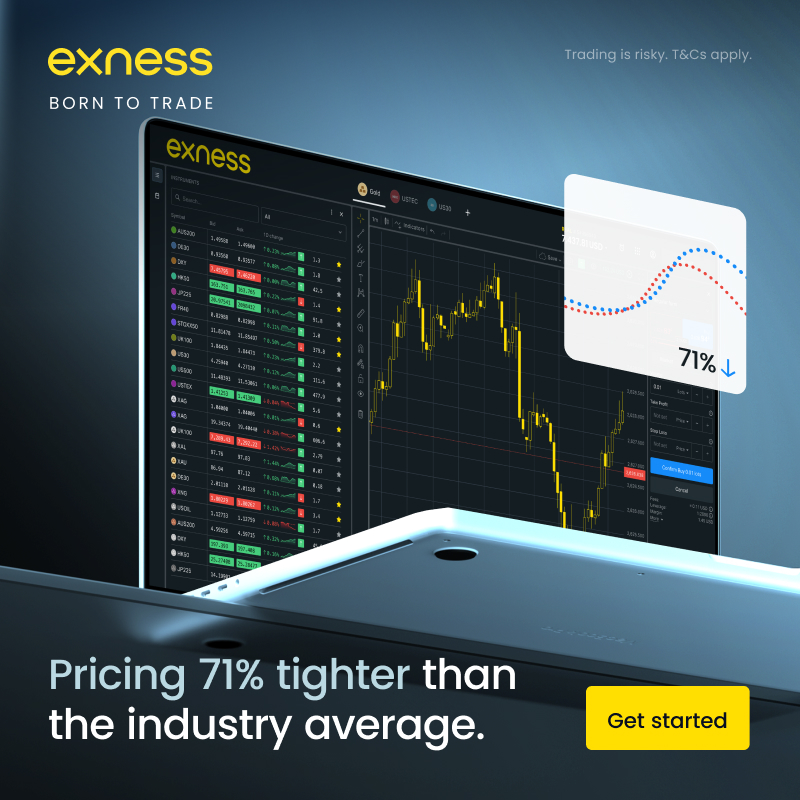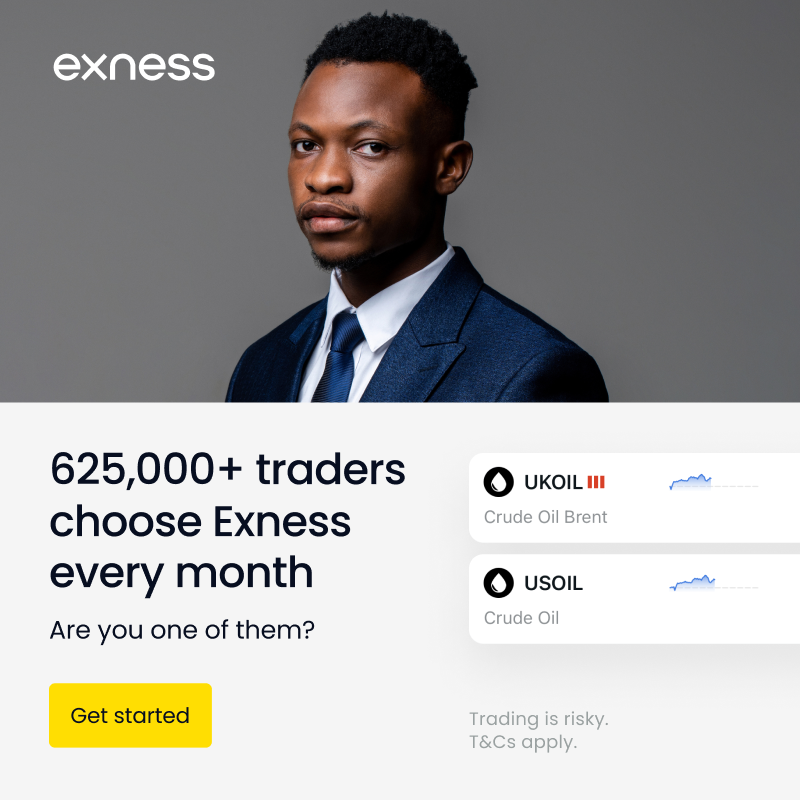
8 minute read
Exness vs FXTM: Which Broker Is Better?
from Exness
by Exness Blog
Deciding between Exness and FXTM can be tough—both are top-tier forex brokers, but the best choice depends on your trading goals. Whether you’re a beginner seeking low-risk accounts or an experienced trader chasing tight spreads and high leverage, this guide compares Exness and FXTM across fees, platforms, instruments, and more to help you pick the right broker in 2025. Let’s dive into the details.

✅ Trade with Exness now: Open An Account or Visit Brokers 👈
Quick Answer: Exness or FXTM?
If you’re looking for ultra-low spreads, instant withdrawals, and unlimited leverage, Exness is likely your go-to. It’s a favorite among experienced traders and scalpers who prioritize cost-effective trading and flexibility.
On the other hand, FXTM shines for beginners, thanks to its extensive educational resources, diverse account types like Cent accounts, and a broader range of trading instruments. Your choice depends on your trading style, experience level, and priorities—keep reading for the full scoop.
Overview of Exness and FXTM
Before we get into the nitty-gritty, let’s set the stage. Exness, founded in 2008 and headquartered in Cyprus, is a global powerhouse with over 300,000 active clients and a massive $2 trillion monthly trading volume. It’s known for tight spreads, high leverage, and a slick proprietary platform.
FXTM (ForexTime), launched in 2011, serves over 1 million clients across 150 countries and is celebrated for its beginner-friendly approach, robust educational tools, and diverse asset offerings. Both are regulated by top-tier authorities like the FCA (UK), CySEC (Cyprus), and FSCA (South Africa), so safety isn’t a concern here.
Now, let’s compare them head-to-head across key factors.
1. Regulation and Safety: Who’s Got Your Back?
Trust is non-negotiable when picking a broker. Both Exness and FXTM are heavily regulated, but they differ slightly in scope.
Exness: Regulated by multiple bodies, including CySEC, FCA (for B2B), FSCA, and the FSA in Seychelles. It segregates client funds, offers negative balance protection across all regions, and undergoes regular audits by Deloitte. Its trust score is an impressive 97/100, making it a rock-solid choice.
FXTM: Also regulated by FCA, CySEC, FSCA, and Mauritius FSC. It segregates funds and uses SSL encryption for secure transactions. However, negative balance protection isn’t standard in all regions, which could be a drawback for high-risk traders. Its trust score is slightly lower at 93/100.
Verdict: Exness edges out slightly with broader regulatory coverage and universal negative balance protection, making it a safer bet for risk-averse traders.
2. Trading Fees: Where’s the Better Deal?
Trading costs can make or break your profits, so let’s talk spreads and commissions.
Exness: Known for ultra-tight spreads, starting at 0.0 pips on Raw Spread and Zero accounts (with a commission of up to $3.50 per lot per side). Standard accounts have no commissions, with average spreads of 1.0 pips for EUR/USD. Exness also boasts no withdrawal or deposit fees, and its instant withdrawal system is a game-changer.
FXTM: Offers competitive spreads, starting at 0.0 pips on its Advantage account with commissions as low as $0.80 per lot. Standard accounts (Advantage Plus) have higher spreads, averaging 2.1 pips for EUR/USD, but no commissions. FXTM charges withdrawal fees for some methods, and inactivity fees may apply.
Verdict: Exness wins for lower overall spreads and fee-free withdrawals, especially for active traders. FXTM’s low commissions are great, but its higher standard account spreads and fees tip the scale.
3. Trading Platforms: Which One Feels Right?
Your platform is your trading cockpit—ease of use and features matter.
Exness: Offers MetaTrader 4 (MT4), MetaTrader 5 (MT5), the Exness Terminal (a user-friendly web platform), and the Exness Trade App with real-time data and signals. It supports Expert Advisors (EAs), one-click trading, and social trading, making it versatile for all traders.
FXTM: Provides MT4 and MT5, but with a catch—MT4 is limited to 60 days, and MT5 to 30 days for demo accounts. It also offers the FXTM Trader app, which is intuitive for beginners. FXTM supports EAs and one-click trading but lacks a proprietary platform like Exness.
Verdict: Exness takes the lead with its proprietary platforms and no time limits on demo accounts, offering more flexibility. FXTM’s platforms are solid but less comprehensive.

✅ Trade with Exness now: Open An Account or Visit Brokers 👈
4. Account Types: Options for Every Trader
Different traders need different accounts, so let’s see what’s on offer.
Exness: Provides five account types: Standard, Standard Cent (ideal for beginners with micro-lots), Pro, Raw Spread, and Zero. Minimum deposits range from $0 (Standard) to $200 (professional accounts). The Standard Cent account is great for testing strategies with minimal risk.
FXTM: Offers Cent, Standard, Advantage, and Advantage Plus accounts, plus Micro accounts for low-risk trading. Minimum deposits start at $10, making it accessible. The Cent account is perfect for beginners, and Islamic (swap-free) accounts are available for both brokers.
Verdict: FXTM is slightly more beginner-friendly with lower minimum deposits and Cent accounts, but Exness’s variety and zero-deposit Standard account give it a slight edge for flexibility.
5. Trading Instruments: What Can You Trade?
Diversifying your portfolio? Here’s what each broker offers.
Exness: Over 230 instruments, including 100+ forex pairs, cryptocurrencies, stocks, indices, metals, energies, and commodities. Its crypto CFD offerings are a standout, but it lacks direct share investments.
FXTM: Boasts over 1,000 instruments, including 60+ forex pairs, stock CFDs, futures, indices, commodities, and cryptocurrencies. It also offers direct share investments and thematic stock baskets, giving it a broader scope.
Verdict: FXTM wins for its larger instrument portfolio, especially for stock and futures traders. Exness is better for crypto-focused traders.
6. Leverage: How Much Power Do You Need?
Leverage can amplify your gains (and losses), so it’s a big deal.
Exness: Offers unlimited leverage on some accounts (with restrictions based on experience and region). For volatile assets like crypto, leverage is lower but still competitive.
FXTM: Provides leverage up to 1:2000, which is high but not unlimited. Leverage varies by instrument and region, with tighter restrictions for volatile markets.
Verdict: Exness’s unlimited leverage is a unique draw for experienced traders, but both brokers offer high leverage suitable for most strategies.
7. Education and Support: Who Helps You Grow?
Learning and support can make a huge difference, especially for newbies.
Exness: Offers decent educational resources, including webinars and market analysis, but it’s more geared toward experienced traders. Its 24/7 multilingual support via phone, chat, and email is highly responsive.
FXTM: Excels with its ForexTime Academy, offering structured courses, tutorials, webinars, and market analysis. It’s a goldmine for beginners. Support is also 24/5 and multilingual, with positive reviews for responsiveness.
Verdict: FXTM is the clear winner for educational resources, making it ideal for beginners. Exness’s support is excellent but leans more toward practical tools for pros.
8. Deposits and Withdrawals: How Easy Is It to Move Money?
Seamless transactions are crucial for a smooth trading experience.
Exness: Supports instant deposits and withdrawals with no fees across methods like VISA, Bitcoin, Neteller, and local bank transfers. It accepts over 40 currencies, including ZAR, which is great for South Africans.
FXTM: Offers multiple payment methods (VISA, Skrill, Bitcoin, etc.), but withdrawal fees may apply, and processing times can take up to 10 days depending on the method and region.
Verdict: Exness dominates with fee-free, instant withdrawals, giving traders more control over their funds.
Who Should Choose Exness?
Exness is your broker if:
You’re an active trader or scalper chasing the lowest spreads and commissions.
You value instant, fee-free withdrawals.
You want unlimited leverage and a variety of platforms, including a proprietary one.
You trade cryptocurrencies or prefer a broker with a massive forex pair selection.
Who Should Choose FXTM?
FXTM is the better pick if:
You’re a beginner needing robust educational resources and low-risk accounts like Cent or Micro.
You want to trade a wider range of instruments, including stocks and futures.
You prefer fixed spreads for predictable costs (available on some accounts).
You’re in the UK and interested in spread betting.
Final Thoughts: Exness or FXTM in 2025?
Both Exness and FXTM are stellar brokers, but they cater to slightly different crowds. Exness is the go-to for experienced traders who prioritize low costs, high leverage, and fast withdrawals. Its tight spreads and proprietary platforms make it a powerhouse for active trading. FXTM, however, is a beginner’s dream, with its educational resources, diverse instruments, and low-deposit accounts. If you’re new to trading or want to explore stocks and futures, FXTM has the edge.
Ultimately, your choice depends on your goals. If cost and speed are your top priorities, go with Exness. If education and variety matter more, FXTM is your match. Try a demo account with both to see which feels right—after all, the best broker is the one that fits your trading style.
✅ Trade with Exness now: Open An Account or Visit Brokers 👈
Read more:










